Seán McCabe, head of climate justice and sustainability at Bohemian FC, explains why bold and transformative actions are necessary to transcend the ‘deceptive notion’ of net zero
The Cambridge Dictionary defines ‘bohemian’ as someone who embraces artistic and unconventional lifestyles, shunning societal norms. Interestingly, this definition not only suits individuals but also finds its embodiment in Bohemian FC – a historic Irish football team that adopted the name in 1890.
After 133 years, the club’s nonconformist spirit is now channeled into a groundbreaking environmental endeavour. While most organisations, including those in the sporting world, shy away from such bold goals, Bohs are fearlessly leading the way. By 2035, they aim to achieve a remarkable feat: reaching true zero emissions, not relying on mere offsets, setting a precedent for others to follow.
The club announced this target in March as part of its FSR/Community Strategy 2023-2027, one of its main focuses being climate justice and sustainability.
“It’s so important that we stop talking about net zero by 2050 and net zero all together, because that’s an accounting trick,” says Bohs’ climate justice officer, Seán McCabe, who appeared on The Sustainability Report podcast last year to discuss climate justice. “It’s not going to work. It’s quite a morally bankrupt piece of language that has managed to really become ubiquitous.”
With net zero as the most proliferative environmental goal, McCabe believes we have too easily slipped into the attitude that it’s about ‘doing your little bit for the environment, which is better than nothing at all.’
“I think that’s quite a dangerous message that has existed in the environmental space for far too long,” he remarks. “There’s massive structural issues that need to change.”
McCabe suggests that the typical environmental initiatives football clubs implement, such as encouraging the use of reusable cups, “are important environmentally”, but “are not going to prevent the climate crisis.”
Evidence reflects this sentiment. Only last month, the European Union advisory board produced a report that indicated The European Union should reduce greenhouse gases by as much as 95% by 2040 to achieve its objective of reaching climate neutrality by 2050.
“Too many people still exist in a magical land,” declares McCabe. “These climate impacts we’re experiencing are getting so severe, and yet we don’t need to get to zero until 2050. And even then, it doesn’t have to be real zero. It can just be you bought a load of trees in Equatorial Guinea. We need realism very urgently.”
In the north Dublin district of Phibsborough, Bohemian FC stands as the resilient pillar of realism. As societal institutions like the church have waned in influence, this football club remains the sole ingrained institution, connecting the community with unwavering strength.
“We have to recognise we don’t have time to rebuild an institution that’s capable of delivering climate action all around the world,” says McCabe. “We have to use what’s available to us in this emergency. And one of the things is that trust that people have in football clubs.”
McCabe urges that this isn’t something to be abused, selling recycled shirts to fans or buying a way out of the climate crisis, because “that’s the football club lying in the same way that they’ve been lied to by everyone else.”
For the club to be transformative as a mechanism for empowering climate action, McCabe says it will “alienate” people if messaging is about living more frugally when there’s already a cost-of-living crisis, in Phibsborough and elsewhere. McCabe describes that many in Dublin face the dilemma of eating or heating their homes.
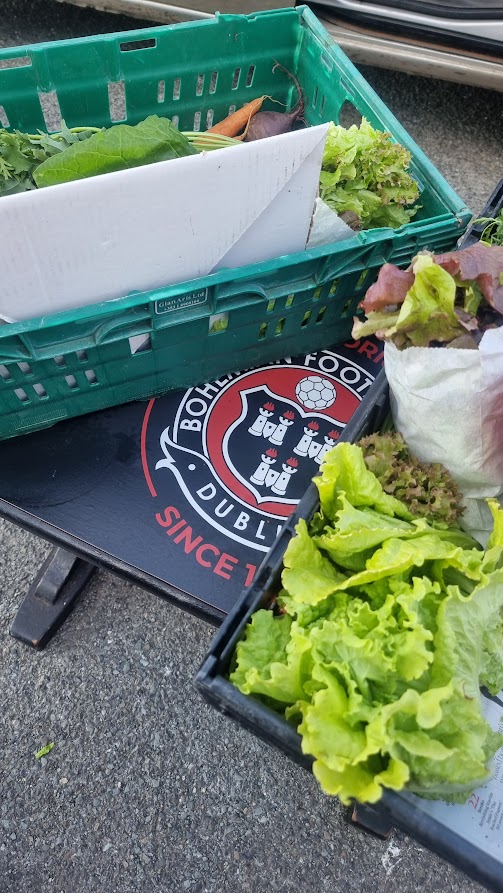
Instead, Bohs has made a “genuine commitment to uplifting people” and improving their lives. Transformative action means improving living standards, job access, and opportunities to access climate solutions that reduce household bills.
The mechanism to enable these outcomes is ‘community wealth-building’, another focus area of the FSR/Community strategy. Simply, community wealth-building challenges traditional economic development practices by funnelling wealth into the local economy and placing control in the hands of local people via a cooperative structure.
“Most people today aren’t used to operating cooperatively. They’re mostly used to being consumers, and that’s the lens through which most of the climate conversation has taken place,” observes McCabe, adding that people need to be “empowered to generate the future they envision for themselves”.
Unlike most football clubs that have fallen victim to the commodification of the sport and aim to make money for private shareholders, Bohs is – and has always been – fully member owned by people in the community, meaning there is no duality between the club and people in its radius. The club provides a pathway for members to become actively involved in decision making as community leaders, shaping programmes that will actually affect them.
Typical climate cooperatives involve sharing energy, but McCabe and Bohs have envisaged something more in ‘The Spark’. This will be a space in Dublin for light industry that includes a ‘Library of Things’ – lending practical items to the community, reducing waste and promoting sharing – a bicycle library, community learning for bike mechanics and retrofitting, as well as a second-hand clothes shop.
One motivation behind the project is Bohs’ desire to expand the cooperative culture within the club to broader culture via learning by doing and enabling community members to be custodians of the projects.
Another lies in the consortium behind The Spark. Funding is normally an issue for such projects, but The Spark has been co-funded until October 2025 by a consortium that includes the sustainable energy communities of Phibsborough, Cabra and Stoneybatter, Stoneybatter Pride of Place, Technological University Dublin, Grangegorman Development Agency, Neighbourhood Network, the Football Association of Ireland, Rothar, and Mountjoy Prison.
A steering committee has been established, composed of consortium representatives and community members, to help McCabe make democratic decisions on the project and be “conduits for information” to bring learnings from The Spark to their various networks.
“We’re still looking at locations. We have quite a specific set of requirements for the space, so we’re going to take our time,” says McCabe, emphasising that, despite the current funding limitations until October 2025, the consortium is endeavouring to find a permanent home for the cooperative. The next step after this would be growth; McCabe references the Basque Mondragon Corporation cooperative that began in 1956 and now employs over 80,000 people as a model.
“We’re really fledgling by comparison,” says McCabe, “but there’s nothing to say that this can’t grow into a long-term sustainable operation that enables our community to lead on climate action, and then delivers real jobs, real opportunities to tackle social inequalities and real opportunities to put money back into our local community.”
It’s evident that extensive education is a key metric to determine the success of The Spark and wider FSR/Community Strategy. Although currently unsure of its structure, McCabe says that the first lesson in The Spark will cover why we can tangibly own the assets of climate action, with basic training programmes in bicycle mechanics, retrofitting and solar photovoltaic. A program is currently being developed for schools to “counter that narrative of individualism within the climate crisis” by focusing on community-led responses. These efforts will be actively focused on Dublin’s highest areas of deprivation and DEIS (Delivering Equality of Opportunity in Schools).
Bohs will also utilise The Spark to provide employment opportunities for those marginalised from society. This links to the FSR/Community Strategy goal of aiming to ‘reduce offending and reoffending in the criminal justice system’.
Mountjoy Prison, one of The Spark’s consortium members, has the largest prison population in Ireland and is less than 200 metres from Dalymount Park, Bohs’ stadium. The club wants to provide opportunities for recently released prisoners, and those nearing release, to reintegrate into the local community.
McCabe is conscious that there’s people serving long-term sentences who will emerge into a “totally reshaped” world where climate issues are suddenly on the agenda. “Why not try to create avenues into an area where we know we need workers?” he asks. “If we’re going to install solar panels on every roof, it’s an all-hands-on deck scenario.”
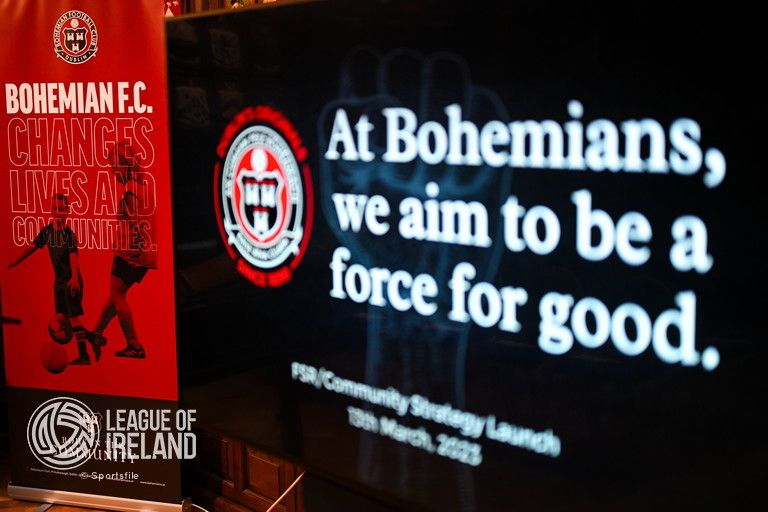
While Bohs pursue such avenues that many other organisations won’t have even considered, McCabe is clear that the club is an open book to sharing information so that others can join their efforts.
“I know that there will be clubs with very conservative shareholders. They’re not exactly going to move particularly quickly on this,” he acknowledges, “but we can’t allow those who are not being realistic about the crisis to set the pace for our response. The primary thing is that we’re realistic about where we have to get to [real zero]. If we can prove that this works in our own way in Phibsborough and Dublin, maybe 20 other clubs will copy it, and that would be a disproportionate impact for a club of our size.”
As part of the European Football for Development Network, Bohs are involved in the ‘Football for Climate Justice’ project with comparatively larger partners, including La Liga, Werder Bremen, Club Brugge, FC St Pauli, FC Twente and Ferencváros. McCabe also suggests that Bohs are seeking to work with environmental justice organisations like Friends of the Earth to optimise fan communication mediums, so that, for example, as many as possible know how they can access retrofits to warm their homes in winter.
The FSR/Community Strategy states that the club’s primary communication tool will be ‘embracing digital technology and utilising video content’, but McCabe also suggests that depending on the subject being communicated, the matchday programme or off-pitch activations could also be used for fan communication.
As McCabe describes, “How do you do it in a way where people who previously would have seen my role and thought, ‘this has got nothing to do with football’, to suddenly realize ‘Bohs are trying to provide us with the tools, rights and access to services that we didn’t know were available to us’.”
Ironically, Bohs’ aspiration is to make ignoring the usually accepted ways of behaving become the norm, but, as club poet-in-residence John Cummins reflects, whether the club can achieve that transition on any scale or not, McCabe, the club and its community will continue walking ‘The Bohemian Way.’
Opt into our weekly newsletter for exclusive content focused on sustainability strategy, communication and leadership for sport’s ecosystem.

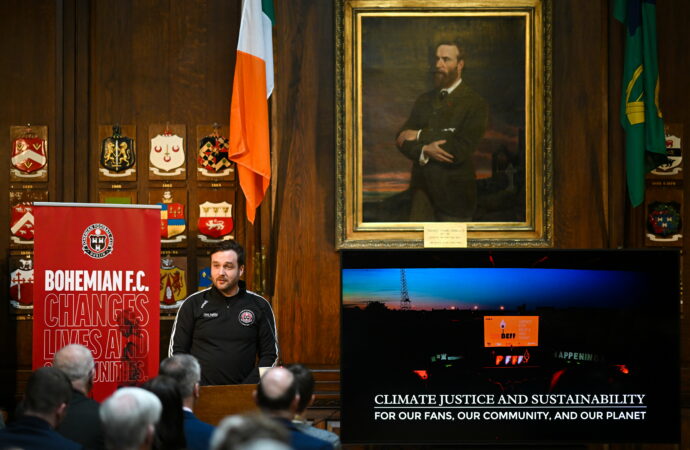




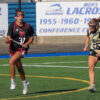
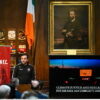


Leave a Comment
Your email address will not be published. Required fields are marked with *